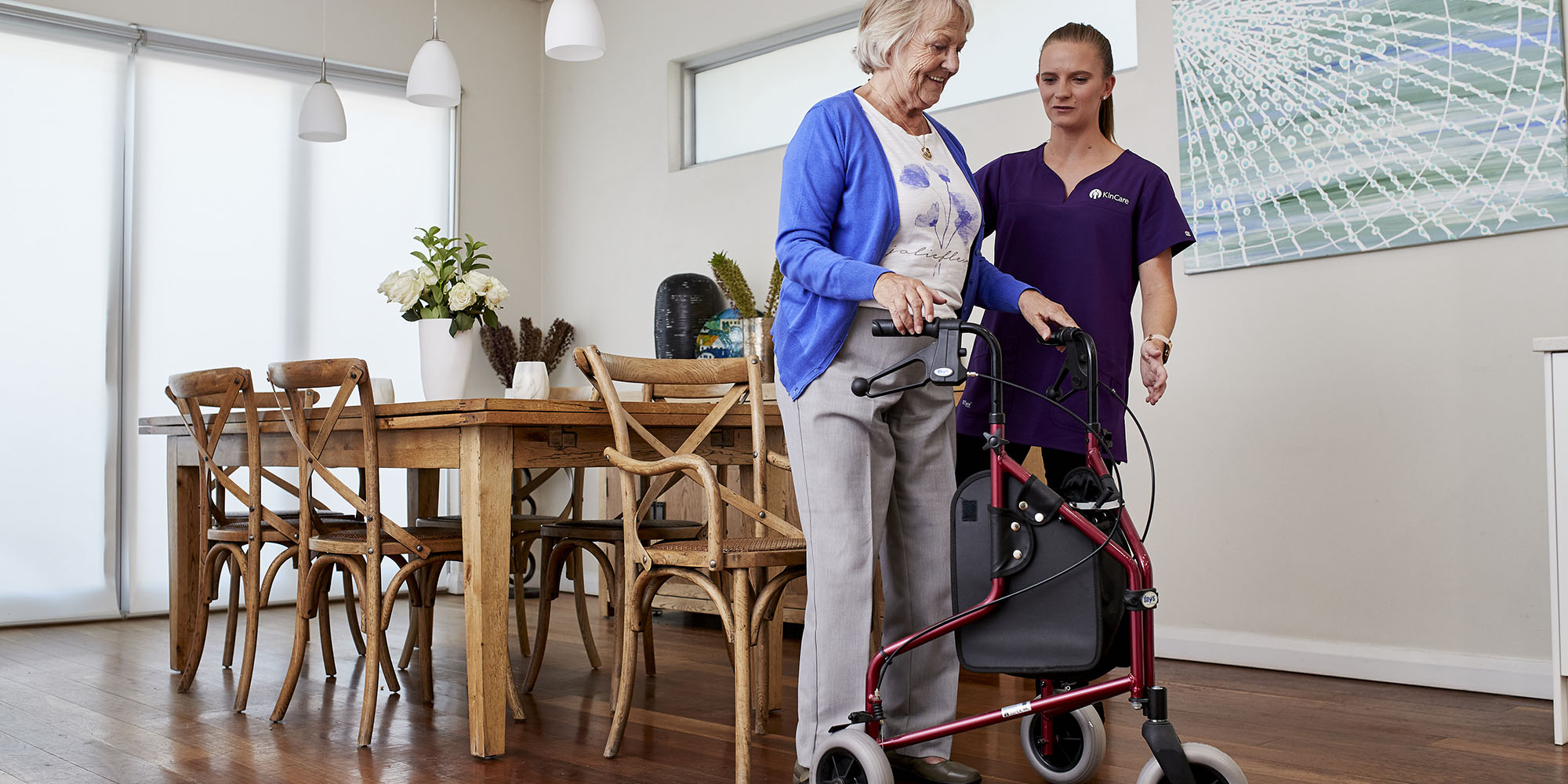
Learn the warning signs of a stroke
by KinCare — 17 August 2022
Did you know stroke is one of Australia’s biggest killers and a leading cause of disability? Stroke kills more women than breast cancer and more men than prostate cancer.
While a stroke can happen to anyone at any age, men are at greater risk and, regardless of gender, the chance of experiencing a stroke increases with age.
Fortunately, more than 80 per cent of strokes are preventable.
At KinCare, our staff are trained to identify the early warning signs of a stroke. You can feel confident, knowing that your wellbeing is in highly capable, knowledgeable hands. And if you or a loved one have experienced a stroke, our Clinical Support Pathway can assist your recovery process at home while supporting caregivers who may be feeling the strain of caring for a loved one post-stroke.
Reduce your risk of stroke with a healthy lifestyle
A stroke happens when blood cannot reach your brain, and is caused by a blocked or burst artery. As a result, your brain cells die due to a lack of oxygen and nutrients, which can affect your body, emotions, and the way you think. A stroke can also cause muscle weakness and problems with speaking, memory, hearing and vision.
There are two types of stroke:
- Ischaemic stroke: caused by a blood clot or when plaque blocks an artery
- Haemorrhagic stroke: caused by an artery breaking or bursting
Going for regular health check-ups with your GP and maintaining a healthy lifestyle by eating a nutritious diet, staying active, not smoking and avoiding alcohol can reduce your risk and help prevent stroke.
Getting medical help as quickly as possible after experiencing a stroke is crucial to your recovery.
A stroke is always a medical emergency. If you or your loved one shows signs of a stroke, call 000 immediately. The longer a stroke remains untreated, the greater the chance of stroke-related brain damage.
Learn to identify the signs of stroke
The Stroke Foundation encourages all Australians to learn the warning signs of stroke and what to do if you see or experience the signs.
Facial weakness, arm weakness and difficulty with speech are the most common symptoms of stroke. Learn the Stroke Foundation’s F.A.S.T test as an easy to way to remember the signs to look out for.
If you think somebody may be experiencing a stroke, ask these simple questions:
- Face – Check their face. Has their mouth drooped?
- Arms – Can they lift both arms?
- Speech – Is their speech slurred? Do they understand you?
Time is critical. If you see any of these signs, call 000 straight away.
Other signs of stroke include:
- Weakness, numbness or paralysis of the face, arm or leg on either or both sides of the body
- Difficulty speaking or understanding
- Dizziness, loss of balance or an unexplained fall
- Loss of vision, sudden blurring or decreased vision in one or both eyes
- Headache, usually severe and abrupt onset or unexplained change in the pattern headaches
- Difficulty swallowing
Trusted, specialist nursing care in your own home
Our care pathways provide a holistic, connected approach to your individual care. After surgery, illness or injury, we provide nursing care around the clock as you recover at home through our Clinical Support Pathway.
Our flexible care pathways can be adapted to meet changed needs after a stroke
Everyone experiences stroke differently. Regardless of the effects you or your loved may experience post-stroke, KinCare will work with you to develop an in-home care plan suited to your needs. Our care pathways provide a holistic, connected approach to your individual care.
Uttara, a KinCare Clinical Team Leader, says it’s important to share as much information as possible about your stroke and recovery plan with your KinCare Customer Care Manager.
“When a person has had a stroke, any information that the next of kin can provide us will help us to tailor support services. This includes all the support plans from the hospital and GP, such as the social work plan, nursing care plan, and any information about the warning signs.”
At KinCare, we tailor our services to meet each individual’s needs, including taking into consideration the severity of the stroke.
KinCare provides a wide range of services post-stroke
“Post-stroke customers may have a higher risk of falls, so to start with, we will send an occupational therapist to you or your loved one’s home to make sure the environment is safe. Our occupational therapist will assess the physical environment to make sure it has the supports the customer needs to make their lives easier post-stroke,” explains Uttara.
“KinCare also has physiotherapists who can visit customers and implement a tailored exercise program or rehab program to help them get moving. And if your loved one had warning signs, we will ask our nursing staff to visit regularly to look out for these signs.”
KinCare’s Personal Care and Domestic Assistance services may also be beneficial for somebody who is recovering from a stroke. Our Home Care Workers help customers with daily tasks like dressing, taking medication and keeping their home in order while they get back on their feet. This can also be helpful for caregivers who may need to take on a greater caring role while their loved one is recovering.
“By sending in our trained staff to clean the house or assist with personal care, we can take away the strain from carers. We also have respite services where our staff stay with customers so carers can take a break from their normal life,” Uttara says.
At KinCare, if you or your loved experiences a stroke, we’ll be right by your side to provide all the support and services you need while recovering at home.